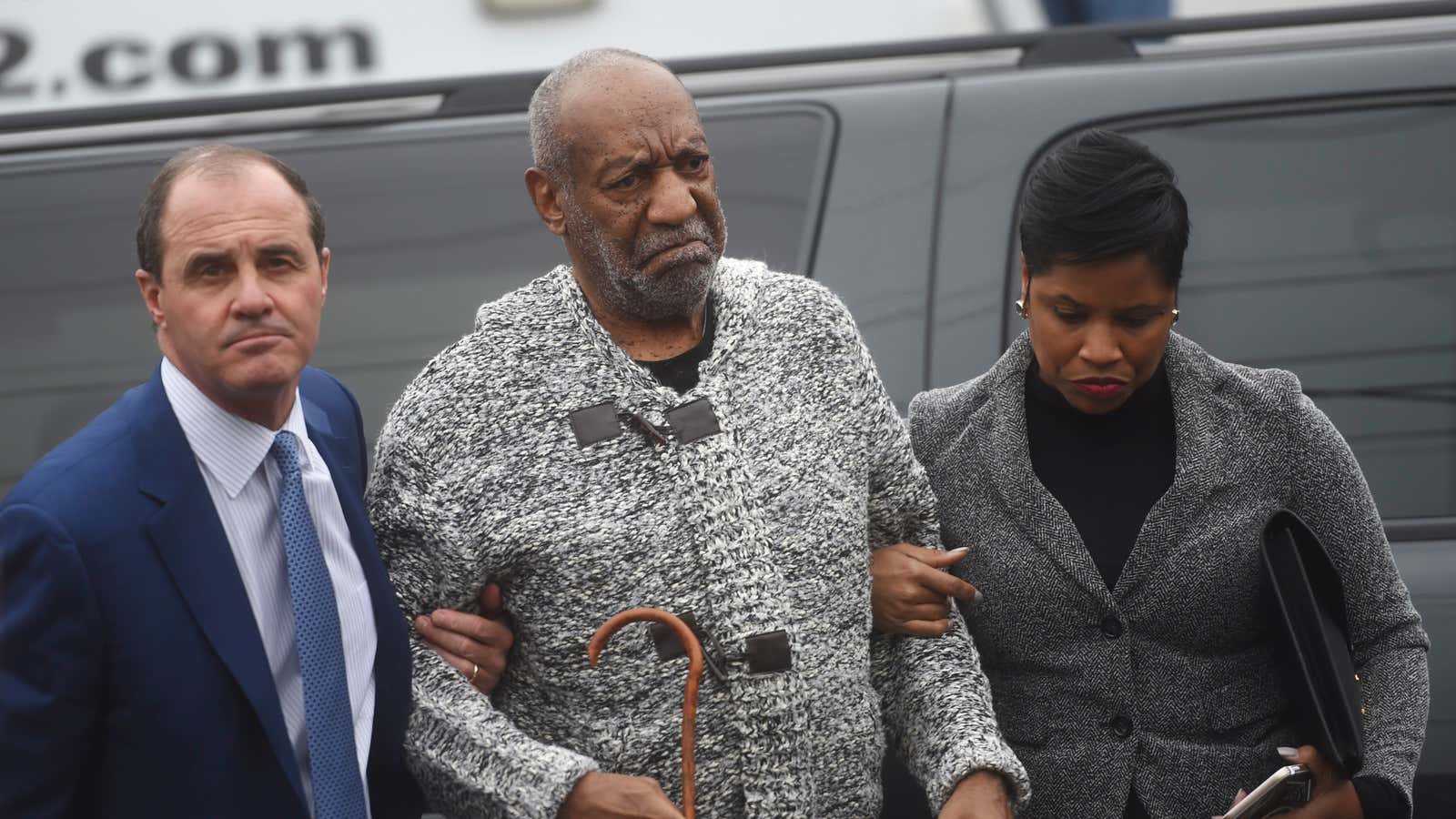On Dec. 30, veteran comedian and sitcom superstar Bill Cosby was charged with first-degree aggravated indecent assault in Montgomery County, Pennsylvania. The charges stem from a 2004 incident in which a former Temple University employee alleges that Cosby drugged and raped her at his mansion.
While sexual assault advocates have hailed the actions of the Pennsylvania district attorney’s office, these charges do not include the dozens of other women who have accused Cosby of raping them over the course of several decades. Many of these allegations only came to light recently, after a viral 2014 stand-up routine from Hannibal Buress brought Cosby’s dubious history back into the media spotlight.
This kind of domino effect is not uncommon with high-profile cases involving alleged serial sexual assaulters. In November, after porn performer Stoya tweeted that her ex-boyfriend and fellow performer James Deen had raped her, several others came forward with similar accusations. Other women have turned to Facebook to name men known to be predators within niche communities. It’s impossible to deny that the mass adoption of social media, combined with increased awareness around issues of sexual assault and media attention, has put us on the precipice of a new moment. But what kind of moment is it, exactly–and will it actually make a long-term difference in the fight against rape?
At first glance, it might make sense to position these women as vigilantes, using their online platforms to take action against rapists and mete out justice to the men who hurt women. And it’s certainly true that online outings can yield IRL results: the fallout from Stoya’s tweet led multiple companies to sever ties with the popular performer, and opened up a discussion about safety and consent within the adult industry. In the best of circumstances, online outings can remove the shields that have protected serial predators, rendering their communities safer and hopefully better prepared to deal with future predators in their midst.
But focusing too much on individual perpetrators risks missing the larger issue; namely, that assault is not an issue of a few bad apples that can be easily removed from the barrel, but a toxic culture that normalizes and ignores rape and abuse. On the internet, where vigilante justice against rapists sits next to—and often overlaps with—campaigns to harass and humiliate women, the dangers of missing the forest for the trees is all too clear.
To get a sense of the cognitive dissonance embedded in the internet’s approach to rape, consider the Steubenville, Ohio, rape case that dominated the media a few years back. Leading the online charge for awareness was hactivist group Anonymous—an organization not generally known for its strong feminist stances—which was all too happy to take the side of women so long as it didn’t mean examining the culture that created the rapists. It’s easy to be the white knight who doxxes and dismantles a monster. It’s far, far harder to take a critical look at the way our own actions contribute to rape culture.
But how can we move past the desire to punish individuals and work to repair the broader system that enables numerous acts of sexual assault?
On January 28, LA-based comedian Beth Stelling offered up a confession on Instagram. Like millions of other women, she is the survivor of an abusive relationship, one that involved physical, emotional, and sexual assaults and–as the photos she posted illustrated–left her battered and bruised. Her post also may offer the beginnings of an alternative model. It is telling that, of the over five hundred words in Stelling’s statement, not one happens to be her abuser’s name. Rather than calling for justice or revenge, Stelling’s post asks for understanding, awareness, and support. In some ways, Stelling’s refusal to name her abuser makes a more powerful statement. Instead of a defined and identified villain, Stelling offers a reminder that rapists and abusers are everywhere–even within our communities, even within ourselves.
Merely being aware of assault and abuse doesn’t do much to end it. But there are actions we can take beyond seeking revenge. For starters, we can use increased awareness as a launch pad for getting educated about the best ways to provide support and healing to rape and abuse survivors–as well as using that awareness to create an environment where survivors feel comfortable coming forward about their experiences (which, not surprisingly, is an important part of healing).
We can also work to combat and dismantle rape culture, calling out media and messaging that reinforces the idea that women are prizes to be won, or machines designed to dispense sex to any man who puts in enough effort. Imagine the progress that might have been made had Anonymous decided to devote the energy put forth in the Steubenville case to, say, calmly and thoughtfully educate Reddit members about consent and respect for women. It is not glamorous work, nor is it particularly exciting, but it is a deeply necessary tool in reducing future instances of rape and abuse.
And of course, on a personal level, we can all use these outings as a reminder to pay attention to our own behavior and actions when it comes to sex and relationships. Are we talking to our partners about their wants, needs, and desires? How do drugs and alcohol interact with our sexual choices, or influence our decision making? Rape and sexual assault are fueled by the stigma around sex that keeps us from talking about–or analyzing–the decisions we make. The more we’re able to talk honestly and thoughtfully about sex and sexuality, the more we can combat rape.
Taking revenge on an accused rapist may be satisfying, but it reinforces the idea that rape is a problem caused by a handful of evil people. It’s not: it’s a system that we are all complicit in, and all responsible for. As social media empowers more and more survivors to speak out about their experiences, let’s take the opportunity to really listen–and really make a change.
